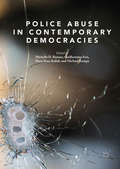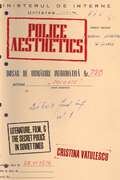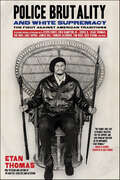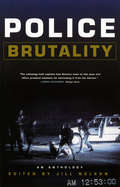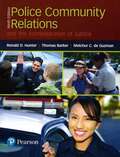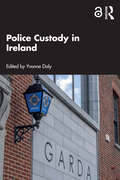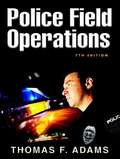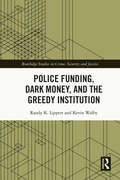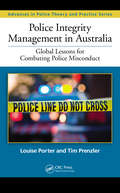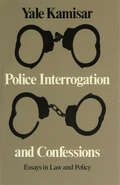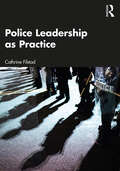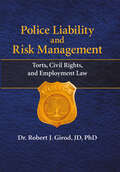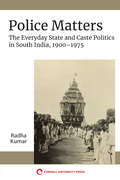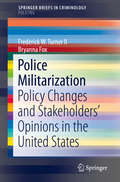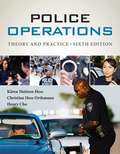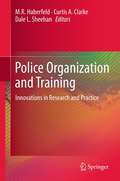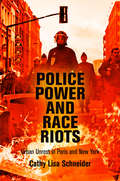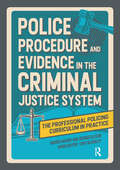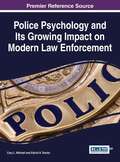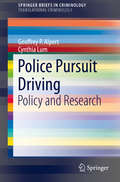- Table View
- List View
Police Abuse in Contemporary Democracies
by Michelle D. Bonner Guillermina Seri Mary Rose Kubal Michael KempaThis volume offers a much-needed analysis of police abuse and its implications for our understanding of democracy. Sometimes referred to as police violence or police repression, police abuse occurs in all democracies. It is not an exception or a stage of democratization. It is, this volume argues, a structural and conceptual dimension of extant democracies. The book draws our attention to how including the study of policing into our analyses strengthens our understanding of democracy, including the persistence of hybrid democracy and the decline of democracy. To this end, the book examines three key dimensions of democracy: citizenship, accountability, and socioeconomic (in)equality. Drawing from political theory, comparative politics, and political economy, the book explores cases from France, the US, India, Argentina, Chile, South Africa, Brazil, and Canada, and reveals how integrating police abuse can contribute to a more robust study of democracy and government in general.
Police Administration: Structures, Processes, and Behavior (8th Edition)
by Leonard Territo Charles R. Swanson Robert W. TaylorThis best-selling text presents a vivid introduction to police organizations that focuses on the procedures, politics and human relations issues police supervisors and administrators must understand in order to succeed. Building on the authors' decades of collective experience in law enforcement, training, and teaching, Police Administration 8e is recognized by both the academic and law enforcement communities as the authoritative treatment of this topic. Fully updated in this edition, it includes the latest on the evolution of American policing, the organization and the leader, the management of police organizations, and modern organizational issues.
Police Administration: Structures, Processes, and Behaviors (Ninth Edition)
by Leonard Territo Charles R. Swanson Robert W. TaylorThis edition blends a comprehensive introduction to police administration with key supporting details.
Police Aesthetics: Literature, Film, and the Secret Police in Soviet Times
by Cristina VatulescuThis volume, at once a history of Soviet cinema and a primer on the historiographical analysis of secret police files, provides an interesting multi-disciplinary discussion of the police in film, police as film makers and the criminal as subject in the darkest corners of the Soviet police state. Arguing that the levels of implicit and explicit control exercised by secret police authorities in Stalin-era Russia created a cultural framework in which art, literature and film, even those not directly affected by the regime, bore the unmistakable mark of their influence. Vatulescu is a professor of comparative literature at New York University. Annotation ©2011 Book News, Inc., Portland, OR (booknews.com)
Police Brutality and White Supremacy: The Fight Against American Traditions
by Etan ThomasAn NBA veteran offers engaging interviews and reflections that explore police brutality, white supremacy, and the struggle for racial justice in America. "Thomas's interviews demand careful reading by all who want to expose racism, hold police accountable, and create an American society that practices social justice." —Library Journal, a Best Book of the Year in Political Science/Civil Rights "My family and I are extremely grateful for the support and love from my brother in the movement, Etan Thomas." —Emerald Garner, daughter of Eric Garner Etan Thomas, an eleven-year NBA veteran and lifelong advocate for social justice, weaves together his personal experiences with police violence and white supremacy with multiple interviews of family members of victims of police brutality like exonerated Central Park Five survivor Raymond Santana and Rodney King’s daughter Lora Dene King; as well as activist athletes and other public figures such as Steph Curry, Chuck D, Isiah Thomas, Sue Bird, Jake Tapper, Jemele Hill, Stan Van Gundy, Kyle Korver, Mark Cuban, Rick Strom, and many more. Thomas speaks with retired police officers about their efforts to change policing, and white allies about their experiences with privilege and their ability to influence other white people. Thomas also examines the history of racism, white supremacy, and the prevalence of both in the current moment. He looks at the origins of white supremacy in the US, dating back to the country’s inception, and explores how it was interwoven into Christianity--interviewing leading voices both in and outside of the church. Finally, with prominent voices in the media and education, Thomas discusses the continued cultivation of these injustices in American society.Police Brutality and White Supremacy demands accountability and justice for those responsible for and impacted by police violence and terror. It offers practical solutions to work against the promotion of white supremacy in law enforcement, Christianity, early education, and across the public sphere. Featuring original interviews with: Steph Curry, Chuck D, Yamiche Alcindor, Isiah Thomas, Jemele Hill, Craig Hodges, Stan Van Gundy, Mark Cuban, Jake Tapper, Mahmoud Abdul-Rauf, Sue Bird, Kyle Korver, Rick Strom, Cenk Uygur, Tim Wise, Chris Broussard, Breanna Stewart, Rex Chapman, Stephen Jackson, Kori Mccoy, Lora Dene King, Chikesia Clemons, Raymond Santana, Alissa Findley, Amber and Ashley Carr, Michelle and Ashley Monterrosa, Chairman Fred Hampton Jr., Abiodun Oyewole, Marc Lamont Hill, Officer Carlton Berkley, Pastor John K. Jenkins Sr., Officer Joe Ested, Captain Sonia Pruitt, and Bishop Talbert Swan.
Police Brutality: An Anthology
by Jill NelsonA landmark work by twelve leading critics and community leaders--essential reading for anyone interested in the history of American race relations. Ignited by the infamous shooting of Amadou Diallo, unarmed and innocent, at the hands of New York City police officers, journalist Jill Nelson was moved to assemble this landmark anthology on the topic of police violence and brutality: an indispensable collection of twelve "groundbreaking" (Ebony) essays by a range of contributors--among them academics, historians, social critics, a congressman, and an ex-New York City police detective. This "important and valuable book" (Emerge) places a centuries-old issue in much-needed historical and intellectual context, and underscores the profound influence police brutality has had in shaping the American identity. "[S]hould be read by anyone concerned about ending brutality, and should be required reading in police academies throughout America!"--Charles J. Ogletree, Jr., Harvard Law School "Without hysteria or hyperbole, [Nelson] examines the issue of police abuse in literary form."--Emerge "A memorable and useful contribution to an increasingly volatile national dialogue."--Publishers Weekly "[N]ot only timely, but explores and exposes the sickness of this unbalanced, uncivilized Western pastime thoroughly."--Chuck D of Public Enemy, author of Fight the Power: Rap, Race, and Reality
Police Chiefs in the UK
by Mark RoycroftThis book examines the changing police landscape over the past 25 years to establish how Police Leadership has evolved to meet this challenge. Through interviews with 35 Chief Police Officers in the UK, the author explores a range of policing issues such as crime investigation, terrorism, police governance, austerity issues, the role of the IPCC and public order provision. The book also highlights views on key topics such as armed policing, globalisation of crime and the structure of forces. Building on the seminal text Chief Constables: Bobbies, Bosses or Bureaucrats by Robert Reiner, which is this year celebrating its 25th anniversary, this book brings research on policing up to date with the modern world. An engaging and well-researched project, this book will be of great interest to scholars of criminal justice, policing and security studies.
Police Community Relations and the Administration of Justice
by Thomas Barker Melchor De Guzman Ronald HunterPolice-Community Relations and the Administration of Justice, Ninth Edition, continues the theme of citizen participation, emphasizes why it is critical to the effectiveness of the criminal justice system, and addresses the dynamic nature of police-community relations. The book focuses on the importance of and strategies for positive police-community interactions and addresses the internal and external communities the police serve. The text's interdisciplinary approach draws data and discussions from a wide range of disciplines and gives students a well-rounded perspective to help them better understand and practice positive police-community relations. The Ninth Edition includes updated data and references throughout; new ideas for addressing the ongoing changes in police-community relations; new insights on how the police organization fits with the community it serves; enhanced information on the dynamics of policing realities; a look at the different levels of communication and how to improve communications; the relationships between the media and the police; and more.
Police Custody in Ireland
by Yvonne DalyPolice Custody in Ireland brings together experts from policing studies, law, criminology, and psychology, to critically examine contemporary police custody in Ireland, what we know about it, how it operates, how it is experienced, and how it might be improved.This first-of-its-kind collection focuses exclusively on detention in Garda Síochána stations, critically examining it from human rights and best practice perspectives. It examines the physical environment of custody, police interview techniques, existing protections, rights, and entitlements, and experiences of specific communities in custody, such as children, ethnic minorities, non-English speakers, the Mincéir/Traveller community, and those with intellectual disabilities or Autism Spectrum Disorder. Police Custody in Ireland gives a snapshot of garda custody as it is now and makes important recommendations for necessary future improvements.An accessible and compelling read, this book will be of interest to those engaged in policing and criminology, as well as related areas of interest such as human rights, youth justice and disability studies.The Open Access version of this book, available at http://www.taylorfrancis.com, has been made available under a Creative Commons [Attribution-Non Commercial-No Derivatives (CC-BY-NC-ND)] 4.0 license.
Police Encounters: Security and Surveillance in Gaza under Egyptian Rule
by Ilana FeldmanEgypt came to govern Gaza as a result of a war, a failed effort to maintain Arab Palestine. Throughout the twenty years of its administration (1948-1967), Egyptian policing of Gaza concerned itself not only with crime and politics, but also with control of social and moral order. Through surveillance, interrogation, and a network of local informants, the police extended their reach across the public domain and into private life, seeing Palestinians as both security threats and vulnerable subjects who needed protection. Security practices produced suspicion and safety simultaneously. Police Encounters explores the paradox of Egyptian rule. Drawing on a rich and detailed archive of daily police records, the book describes an extensive security apparatus guided by intersecting concerns about national interest, social propriety, and everyday illegality. In pursuit of security, Egyptian policing established a relatively safe society, but also one that blocked independent political activity. The repressive aspects of the security society that developed in Gaza under Egyptian rule are beyond dispute. But repression does not tell the entire story about its impact on Gaza. Policing also provided opportunities for people to make claims of government, influence their neighbors, and protect their families.
Police Field Operations
by Thomas Francis AdamsThe industry standard for 21st-century policing, "Police Field Operations" is written from the perspective of a working police officer, presenting real-life scenarios an officer is likely to encounter while on-duty. With its focus on community policing, it describes how and why certain procedures are used, and gives informative techniques from leading police academies from around the country. Provides readers with the widest range of up-to-date information. Use-of-force issues - e. g. , when and how much force to use under what circumstances. Provides clearly defined guidelines for shaping and enforcing policy. Officer Survival and Stress Reduction - Exceptionally complete coverage. Helps readers develop the necessary skills of observations, perceptions, interviewing techniques, and crowd and riot control. Great resource material for those involved in police patrol procedures and police and field operations.
Police Funding, Dark Money, and the Greedy Institution (Routledge Studies in Crime, Security and Justice)
by Kevin Walby Randy K. LippertPolice Funding, Dark Money, and the Greedy Institution is about a pervasive but little-studied phenomenon. Private funding of public police entails private entities sending resources to police through unconventional or hidden channels, sometimes for suspect reasons. The book argues police acquisition of this "dark money" befits the notion of a "greedy institution" that pursues resources beyond ample public funding and needs, and seeks ever more loyal members beyond its traditional boundaries to reproduce itself. The book focuses on private police foundations, corporate sponsorships, and paid detail arrangements primarily in North America, how these funding networks operate and are framed for audiences, and the forms and volumes of capital they generate. Based on interviews with police representatives, sponsors, funders, and foundation representatives as well as records from over 100 police departments, this book examines key issues in private funding of public police, including corporatization, accountability, corruption, and the rule of law. It documents and analyzes the troubling explosion of police foundations and sponsors and corporate paid detail brokers unknown to the public as a social and policy issue and a hidden response to the global police defunding movement. The book also considers potential policy responses and community safety alternatives in a more generous society. An accessible and compelling read, students and scholars in criminology, criminal justice, law, sociology, political science, anthropology, geography, as well as policymakers, will find this timely book revealing of a neglected, growing area of police practice spanning multiple themes and jurisdictions.
Police Integrity Management in Australia: Global Lessons for Combating Police Misconduct (Advances In Police Theory And Practice Ser.)
by Tim Prenzler Louise PorterIn the past two decades, Australia has been the site of major police misconduct scandals and inquiries, leading to reform initiatives at the cutting edge of police integrity management practices. Presenting interviews with key informants and an analysis of key documents, Police Integrity Management in Australia: Global Lessons for Combating Police
Police Interrogation and Confessions
by Yale KamisarA historical overview of the Supreme Court's efforts to deal with a most troublesome and most controversial cluster of problems from pre-Miranda days to the present time.
Police Leadership
by Quinn MccarthyThis volume goes beyond other books on police leadership by exploring the topic from a distinctively police perspective. Based on a leadership model developed specifically for the police leader, the book focuses on behaviour and how that behaviour shapes both the culture and the climate of an organization.
Police Leadership as Practice
by Cathrine FilstadPolice Leadership as Practice applies a leadership-as-practice approach (emphasising leader-employee relationships) to law enforcement. This book provides a progressive and collaborative leadership text for students of law enforcement, as well as insights into leadership dynamics in all organisations for students and researchers of business and management. The police leadership-as-practice perspective provides a holistic understanding of leadership in the police, identifying factors that inhibit and promote learning. It refers to four main components as dynamic and continuously evolving processes: Strategies: social mission and organisation, along with strategies as practice Community: organisational and police culture, identity and belonging, community of practice and competencies Participation: sense-making and discretion; power and politics Activities: learning as practice, change and change management as practice Practical and enriched with case studies, examples and best practice, the textbook is also rigorously research based. Authored by a professor of business and management with specialist knowledge in police leadership, it brings the cutting edge of leadership thinking to the practicalities of policing. It is essential reading for those engaged with policing, leadership roles, and management.
Police Liability and Risk Management: Torts, Civil Rights, and Employment Law
by Robert J GirodLaw enforcement agencies and their employees are continually at risk for potential liability related to torts, civil rights violations, and employment law issues. Litigation may involve suits by the public against officers and the administration, actions by the administration against officers, or actions by officers against the administration or me
Police Matters: The Everyday State and Caste Politics in South India, 1900–1975
by Radha KumarPolice Matters moves beyond the city to examine the intertwined nature of police and caste in the Tamil countryside. Radha Kumar argues that the colonial police deployed rigid notions of caste in their everyday tasks, refashioning rural identities in a process that has cast long postcolonial shadows.Kumar draws on previously unexplored police archives to enter the dusty streets and market squares where local constables walked, following their gaze and observing their actions towards potential subversives. Station records present a textured view of ordinary interactions between police and society, showing that state coercion was not only exceptional and spectacular; it was also subtle and continuous, woven into everyday life. The colonial police categorized Indian subjects based on caste to ensure the security of agriculture and trade, and thus the smooth running of the economy. Among policemen and among the objects of their coercive gaze, caste became a particularly salient form of identity in the politics of public spaces. Police Matters demonstrates that, without doubt, modern caste politics have both been shaped by, and shaped, state policing.Thanks to generous funding from the Andrew W. Mellon Foundation, through The Sustainable History Monograph Pilot, the ebook editions of this book are available as Open Access volumes from Cornell Open (cornellopen.org) and other repositories.
Police Militarization: Policy Changes and Stakeholders' Opinions in the United States (SpringerBriefs in Criminology)
by Frederick W. Turner II Bryanna FoxThis Brief examines the “militarization” of law enforcement in the United States through the lens of the stakeholders primarily responsible for implementing, funding, and enacting the practice. Largely a result of policies such as the war on drugs, war on terror, and the 1033 program, there has been a gradual but dramatic rise in the use of military-grade weapons, equipment, and tactics used by police agencies across the United States. This Brief examines the level of support for various aspects of police militarization by lawmakers, police executives, and local police officers, and how their opinions may differ based upon their current position or demographic features using a series of analyses and propensity score matching techniques.This Brief also provides an overview of some of the key policy changes responsible for police militarization, and provides insights into the views held by policymakers and law enforcement on various aspects of the practice. The results indicate that while many responsible for this shift are in favor of paramilitary procurement programs, there are differing opinions on key issues such as oversight and use of military-grade weapons, equipment and paramilitary tactics.This work will be of interest to researchers in criminology and criminal justice, particularly those with an interest in policing studies, as well as related fields such as public policy, public administration, emergency management, and sociology.
Police Operations: Theory And Practice
by Christine Orthmann Kären Hess Henry ChoThis trusted book provides a focused, practical introduction to the key principles and practices guiding the operations of modern police departments. While maintaining its proven instructional approach and strong focus on community- and problem-oriented policing, the sixth edition of POLICE OPERATIONS: THEORY AND PRACTICE reflects the latest trends and research shaping the day-to-day operations of progressive police departments. A new Perspectives from a First-Line Supervisor feature shares practical, applied information. Highlights include new and revised information on evolving technology, the police officer hiring process, how police use websites and social media to communicate with the public, patrol techniques, cultural diversity, cell phone use and laws, hazardous materials response, federal emergency response agencies, and cyberterrorism. The authors complement this wealth of information with an appealing writing style, numerous photos and illustrations, and real-life examples to engage your interest, enhance learning, and demonstrate the professional relevance of chapter material. Now better than ever, this convenient book is an ideal resource for law enforcement students and professionals who want an accessible, up-to-date guide to essential principles and current trends and practices in police operations.
Police Organization and Training
by M. R. Haberfeld Dale L. Sheehan Curtis A. ClarkeCriminal enterprises are growing in sophistication. Terrorism is an ongoing security threat. The general public is more knowledgeable about legal matters. These developments, among others, necessitate new methods in police work--and in training new recruits and in-service officers. Given these challenges, improvements in training are a vital means of both staying ahead of lawbreakers and delivering the most effective services to the community. Police Organization and Training surveys innovations in law enforcement training in its evolution from military-style models toward continuing professional development, improved investigation methods, and overall best practices. International dispatches by training practitioners, academics, and other experts from the US, the UK, Canada, Germany, Hong Kong, and elsewhere emphasize blended education methods, competency-building curricula, program and policy development, and leadership concepts. These emerging paradigms and technologies, coupled with a clear focus on ethical issues, provide a lucid picture of the future of police training in both educational and law enforcement contexts. In addition, the book's training templates are not only instructive but also adaptable to different locales. Featured in the coverage: Simulation technology as a training tool, the Investigation Skill Education Program and the Professionalizing Investigation Program, redesigning specialized advanced criminal investigation and training, a situation-oriented approach to addressing potentially dangerous situations, developments in United Nations peacekeeping training and combating modern piracy Police Organization and Training is a key resource for researcher sand policymakers in comparative criminal justice, police and public administration, and police training academies. It also has considerable utility as a classroom text in courses on policing and police administration. Includes a forward by Ronald K Noble, Secretary General of INTERPOL.
Police Power and Race Riots: Urban Unrest in Paris and New York
by Cathy Lisa SchneiderThree weeks after Lyndon Johnson signed the Civil Rights Act of 1964, a New York City police officer shot and killed a fifteen-year-old black youth, inciting the first of almost a decade of black and Latino riots throughout the United States. In October 2005, French police chased three black and Arab teenagers into an electrical substation outside Paris, culminating in the fatal electrocution of two of them. Fires blazed in Parisian suburbs and housing projects throughout France for three consecutive weeks. Cathy Lisa Schneider explores the political, legal, and economic conditions that led to violent confrontations in neighborhoods on opposite sides of the Atlantic half a century apart.Police Power and Race Riots traces the history of urban upheaval in New York and greater Paris, focusing on the interaction between police and minority youth. Schneider shows that riots erupted when elites activated racial boundaries, police engaged in racialized violence, and racial minorities lacked alternative avenues of redress. She also demonstrates how local activists who cut their teeth on the American race riots painstakingly constructed social movement organizations with standard nonviolent repertoires for dealing with police violence. These efforts, along with the opening of access to courts of law for ethnic and racial minorities, have made riots a far less common response to police violence in the United States today. Rich in historical and ethnographic detail, Police Power and Race Riots offers a compelling account of the processes that fan the flames of urban unrest and the dynamics that subsequently quell the fires.
Police Procedure and Evidence in the Criminal Justice System (The Professional Policing Curriculum in Practice)
by Barrie Archer George EllisonPolice procedure and evidence brought to life!A key text for all those on policing degree or other pre-join routes, this book examines police procedure and evidence in the criminal justice system, providing clear and accessible information while encouraging analysis and reflection. Chapters cover police powers, stop and search, arrest and custody, disposals, court procedures and disclosure, and rehabilitation. Uniquely it follows the journey of a fictional family who all in one way or another become involved in the criminal justice system, allowing students to consider a range of possible options and outcomes and bringing the theory to life.
Police Psychology and its Growing Impact on Modern Law Enforcement (Advances in Psychology, Mental Health, and Behavioral Studies)
by Cary Mitchell Edrick DorianPolice psychology has become an integral part of present-day police agencies, providing support in the areas of personnel assessment, individual and organizational intervention, consultation, and operational assistance. Research-based resources contribute to those efforts by shedding light on best practices, identifying recent research and developments, and calling attention to important challenges and growth areas that remain. <p><p> Police Psychology and Its Growing Impact on Modern Law Enforcement emphasizes key elements of police psychology as it relates to current issues and challenges in law enforcement and police agencies. Focusing on topics relevant to assessment and evaluation of applicants and incumbent officers, clinical intervention and prevention, employee wellness and support, operational consultation, and emerging trends and developments, this edited publication is an essential reference source for practicing police psychologists, researchers, graduate-level students, and law enforcement executives.
Police Pursuit Driving
by Cynthia Lum Geoffrey P. AlpertPolice pursuits, often receiving a lot of media attention, have become a topic of concern and priority for both law enforcement and the communities they serve They often come with high risks for the well-being of community members and for both the police officers involved in the chase as well as for the fleeing suspects In this brief, we summarize what is known about police pursuits, from both legal decisions and criminological research. We then discuss the impact of this research on police pursuit policy, court decisions, and media reports. We offer suggestions about the need for more development and use of research, and the challenges for research to be integrated into police policies, training, supervision and accountability systems.
